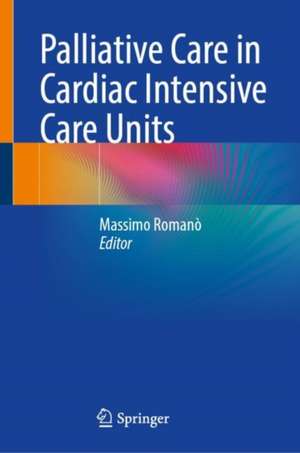Palliative Care in Cardiac Intensive Care Units
Editat de Massimo Romanòen Limba Engleză Hardback – 30 sep 2021
The changing epidemiology of patients has led to new and emerging patient needs at the end of life. Care has shifted from acute coronary syndrome patients towards elderly patients, with a high prevalence of non-ischemic cardiovascular diseases and a high burden of non-cardiovascular comorbid conditions: both increase the susceptibility of patients to developing life-threatening critical conditions. These conditions are associated with a significant symptom burden, high mortality rate, and increased length of stay.
The main new challenges involve shared decision-making, symptom control (pain, dyspnea, etc.), and ethical issues (withholding/withdrawing life sustaining treatments, deactivation of implanted cardiac devices, palliative sedation), all of which necessitate formal education on end-of-life care.
Written by opinion leaders in their respective fields, who share their experience with improving the cultural and clinical competence of medical/nursing teams, this volume is chiefly intended for cardiologists, anesthesiologists, palliative care doctors and nursing staff.
| Toate formatele și edițiile | Preț | Express |
|---|---|---|
| Paperback (1) | 639.57 lei 39-44 zile | |
| Springer International Publishing – oct 2022 | 639.57 lei 39-44 zile | |
| Hardback (1) | 839.41 lei 39-44 zile | |
| Springer International Publishing – 30 sep 2021 | 839.41 lei 39-44 zile |
Preț: 839.41 lei
Preț vechi: 883.60 lei
-5% Nou
Puncte Express: 1259
Preț estimativ în valută:
160.67€ • 168.67$ • 132.73£
160.67€ • 168.67$ • 132.73£
Carte tipărită la comandă
Livrare economică 27 ianuarie-01 februarie 25
Preluare comenzi: 021 569.72.76
Specificații
ISBN-13: 9783030801113
ISBN-10: 303080111X
Pagini: 195
Ilustrații: XIII, 195 p. 19 illus., 17 illus. in color.
Dimensiuni: 155 x 235 mm
Greutate: 0.5 kg
Ediția:1st ed. 2021
Editura: Springer International Publishing
Colecția Springer
Locul publicării:Cham, Switzerland
ISBN-10: 303080111X
Pagini: 195
Ilustrații: XIII, 195 p. 19 illus., 17 illus. in color.
Dimensiuni: 155 x 235 mm
Greutate: 0.5 kg
Ediția:1st ed. 2021
Editura: Springer International Publishing
Colecția Springer
Locul publicării:Cham, Switzerland
Cuprins
1. Epidemiology and patterns of care in the modern Cardiac Intensive Care Units.- 2. The intensive and advanced treatments in the Cardiac Intensive Care Units.- 3. Symptoms assessment and management.- 4. The meanings of prognosis: when and how to discuss it?.- 5. Informed consent, advance directives and shared care planning.- 6. Withholding or withdrawing life sustaining treatments.- 7. Deactivation of cardiac implanted electronic devices (CIEDs)at the end of life.- 8. Withdrawal of Mechanical Circulatory Support in the Cardiac Intensive Care Unit.- 9. Do not attempt resuscitation orders in CICU.- 10. Palliative sedation in CICU: when, how, why.- 11. Nursing and the end of life in Cardiac Intensive Care Unit.- 12. Conflict management in CICU.- 13. Ethical considerations in the use of Technology in the CICU.- 14. Physician education and training in Palliative Care: a new challenge in modern Cardiac Intensive Care Unit.
Notă biografică
Massimo Romanò has been a Cardiologist in the Italian National Health System for 40 years. A past Head of Cardiac Electrophysiology at Garbagnate Milanese Hospital, Italy and past Head of the Cardiology Division at Vigevano Hospital, Italy, he has also been a Consultant at the Interdepartmental Center of Research on Palliative Care, University of Milan and a Member of the Organizing Committee for the 2nd Level Master in Palliative Care at the University of Milan. Since the early 2000s he has developed a particular interest in advanced heart failure and in end-of-life issues. He was involved in a drafting an Italian position paper on shared care planning for end stage chronic organ failures. He has also published papers on palliative care issues in cardiac intensive care units, and on the deactivation of implanted cardiac devices at the end of life.
Textul de pe ultima copertă
This book analyzes the main topics of Palliative Care in Cardiac Intensive Care Units (CICU), from the changing epidemiology of patients admitted to the ICU, to the main clinical and ethical issues.
The changing epidemiology of patients has led to new and emerging patient needs at the end of life. Care has shifted from acute coronary syndrome patients towards elderly patients, with a high prevalence of non-ischemic cardiovascular diseases and a high burden of non-cardiovascular comorbid conditions: both increase the susceptibility of patients to developing life-threatening critical conditions. These conditions are associated with a significant symptom burden, high mortality rate, and increased length of stay.
The main new challenges involve shared decision-making, symptom control (pain, dyspnea, etc.), and ethical issues (withholding/withdrawing life sustaining treatments, deactivation of implanted cardiac devices, palliative sedation), all of which necessitate formal education on end-of-life care.
Written by opinion leaders in their respective fields, who share their experience with improving the cultural and clinical competence of medical/nursing teams, this volume is chiefly intended for cardiologists, anesthesiologists, palliative care doctors and nursing staff.
The main new challenges involve shared decision-making, symptom control (pain, dyspnea, etc.), and ethical issues (withholding/withdrawing life sustaining treatments, deactivation of implanted cardiac devices, palliative sedation), all of which necessitate formal education on end-of-life care.
Written by opinion leaders in their respective fields, who share their experience with improving the cultural and clinical competence of medical/nursing teams, this volume is chiefly intended for cardiologists, anesthesiologists, palliative care doctors and nursing staff.
Caracteristici
Presents comprehensive coverage of the topic Improves the care of patients admitted to the Cardiac Intensive Care Unit, by addressing their needs, symptom evaluation and treatment Improves the training of cardiologists, anaesthesiologists, palliative care doctors and ICU nursing staff
